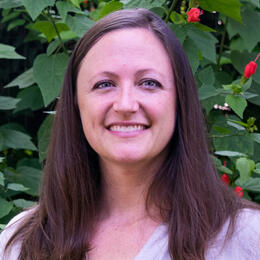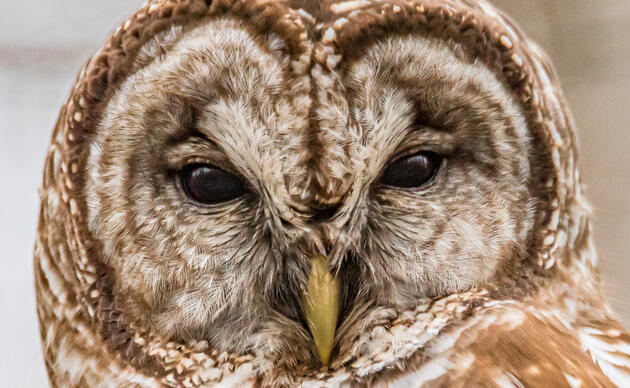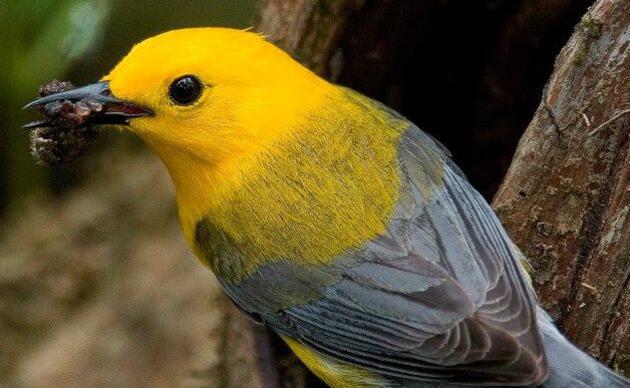What's your educational background and experience?
I was born and raised in New Hampshire, and graduated in 2021 from Bowdoin College in Maine with a B.A. in Biology, concentration in Ecology, Evolution, & Marine Biology. During my time there I ran the Bowdoin Naturalists Club, participated in the Bowdoin Marine Science Semester, and spent a semester in Tanzania studying Wildlife Management with the School for Field Studies. Since graduating, I’ve been moving around the country (and continent!) for various seasonal roles doing both education/outreach and research. I have made a point to work with wildly different ecosystems and species as I try to narrow down what kind of system and questions I want to study for my graduate degree. Last summer I worked on an American kestrel conservation and GPS-tracking project in Utah with HawkWatch International, and most recently I was in Panamá studying frog-eating bat behavior with the Smithsonian Tropical Research Institute! This internship will be my first time working with songbirds, and this fall I’m hoping to start applying to PhD programs studying avian spatial ecology.
What made you decide to focus on birds?
Despite intending to focus on marine biology, my college courses also allowed me to explore terrestrial biology and ecology. In the process I became friends with several birders who roped me into the world of birds. My sophomore year, I got a grant that allowed me to volunteer on an owl research team in southern Arizona for a week, where I learned about mist netting and data collection on whiskered screech and elf owls! It was pure magic, and led directly to my kestrel internship several years later. I’ve since studied plants, insects, megaherbivores, bats, and marine invertebrates, but I keep coming back to the birds and plan on continuing to do so in grad school and beyond.
Do you have a spark bird?
Leach’s storm petrel! They’re these amazing little seabirds who nest on small islands in underground burrows but forage out at sea. To avoid predation, they mainly approach land under the cover of darkness, so at night you’re just surrounded by their wingbeats and vocalizations (trilling purrs and an elf-like ‘chuckle’) drifting through the sea mist. I spent a summer doing marine research on an island where they breed, and several of my friends were on the petrel research team. Being surrounded by such fascinating and charismatic birds (in addition to having so much cool bird research happening around me) was definitely a pivotal experience in my journey to becoming a birder and ornithologist.
Do you have a funny or interesting bird story?
My parents’ home had a little birdhouse in the backyard that went largely unused, but a few years ago I found black-capped chickadees nesting in there. The following year I was excited to see if they had come back, but you can imagine my surprise when instead of being greeted by eggs or fuzzy nestlings, a small, very fluffy mammal jumped out at me instead. We had a family of flying squirrels living with us! Although quite common, they’re nocturnal and usually hard to observe, but I set up a trail camera and we ended up getting some really cool footage of the female going in and out of the box over the course of several nights.
What were your first impressions of the southern swamps? Any surprises?
I’ve spent very little time in the southeast and had never been to South Carolina before this job, so this kind of swamp is an entirely new ecosystem for me. I am already so blown away by how beautiful (and enchanting) it is! There’s just so much life here. I don’t think anything could have prepared me for the awe I felt the first time I walked the Beidler boardwalk knowing that the trees I was surrounded by were centuries old. It’s crazy to think that this swamp looks pretty much just as it would have hundreds of years ago, and I think that knowledge makes the work we do here extra special because we have the privilege of helping protect and conserve it for future generations of humans and birds alike.
What are you hoping to learn while you're here?
Anything and everything! This summer is going to be a huge learning opportunity for me to put together disparate bits of experience I already have (for example, mist netting bats and handling birds of prey) and build on them through new experiences (like mist netting small songbirds, which requires different techniques). I hope to start a PhD in avian spatial ecology in the next year or two, so I see this position as the perfect way for me to round out some of the hands-on skills I’ll need to do graduate-level bird research. However, I also see this as a great opportunity to learn more about pursuing a career in ornithology and conservation in general, so I’ll definitely be gleaning as many bits of wisdom I can from everyone I’ll be working with over the next few months.




